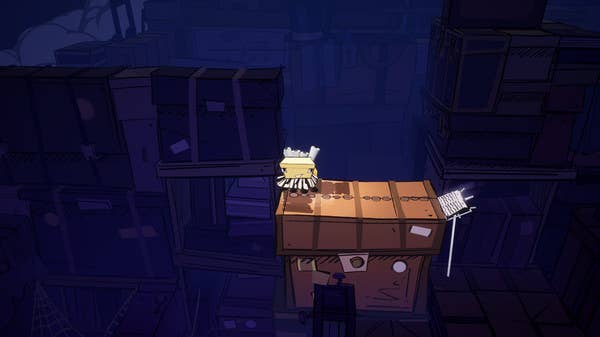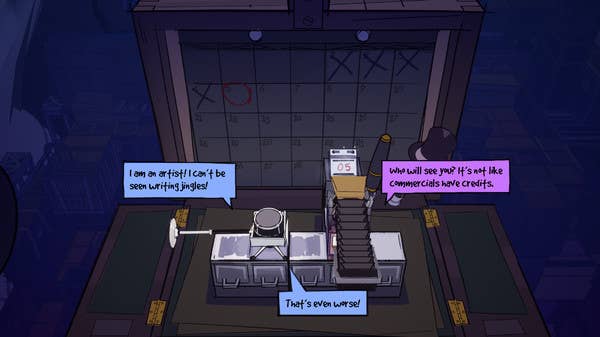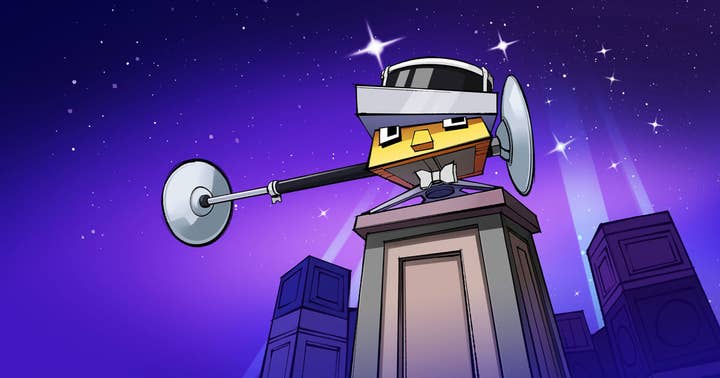Kine: From "artsy bullshit" to Stadia launch title and Epic exclusive
Gwen Frey on the work and luck it took to secure deals on two industry-shaking storefronts
It's rare in the games industry for the stars align perfectly around a project, especially when that project is a single-player, indie puzzle title made by a solo developer. But that's exactly what happened for Gwen Frey.
Frey started in the industry over a decade ago, working as a technical animator on MMOs. Her skills eventually took her to Boston to work on Bioshock Infinite, and when Irrational Games restructured in 2014 she partnered with industry colleagues to found The Molasses Flood. The team created and released The Flame and the Flood, a game that eventually saw success, but struggled for a time as its founders balanced contract work with pitching a new title.
During these pitches, Frey was pondering her own project, a puzzle game about robots that want to be musicians. But though her interest in the idea grew, she couldn't find a place for what would eventually be Kine at a studio that was trying its best to survive.
"Everyone was going on about what you had to do to survive in the indie space, and making a single-player puzzle game was probably not on the docket"
"It was a time where everyone was going on about what you had to do to survive in the indie space, and making a single-player puzzle game was probably not on the docket," Frey tells me in an interview at PAX West earlier this year. "There was an idea of what a profitable game would be, and when you have employees working for you, you want to make sure you're doing right by them. So I kept calling this my 'artsy bullshit.' Every now and then, whenever I had time I was working with this little puzzle game and I fell in love with it."
Frey's "artsy bullshit" turned into a passion she couldn't let go, so she eventually departed Molasses Flood and started her own studio, Chump Squad, just to make Kine. When I remark that this sounds like a risky move, Frey reassures me that it wasn't, but she also notes that the appearance of risk on her part led to possibly one of the most important breaks of her career.
"[Kine] wasn't a risk," she says. "I had enough money to survive for two years and I wanted to make something that was just fun for me. I didn't anticipate making any money off of it, so I didn't put any money into it -- I only put my time into it. It never even occurred to me back then to try to make it a commercially viable product at all.
"But as soon as I quit, a friend reached out because he was really concerned, asking if I was okay and if Molasses Flood was okay and if I needed a job, because they were hiring at Google. And I said that no, I quit to have fun, and I'm really obsessed with this project. He wanted to see it. I showed it to him and he encouraged me to consider, if I could do anything, if I could take this and make it what I wanted it to be, what would it be? And I pitched it to Google."
Frey's connection landed a deal for Kine to be a launch title when Google Stadia drops on November 19. That would have been a happy enough ending for most, but Frey wasn't done. In early December 2018, while Frey was still in talks with Google, she was visiting Epic Games, streaming Unreal development tutorials (something she has done often) on-site, and showing off Kine. In the middle of all that, someone got her attention.
"It never even occurred to me back then to try to make [Kine] a commercially viable product at all"
"I was talking to them and saying, 'Don't tell anyone but I'm going to take [Kine] to Stadia.' 'Oh, you're getting funding? Did you know Epic is funding stuff too?' I'm like, 'Why would you do that?' 'Because we're about to launch a store in two days.' And he shows it to me and asks if I want to pitch this to Epic. Uh, yes?
"And so then I was in a really weird, cool position where I had a choice. I had a game I loved that I really wanted to make, and a dream of up-rezzing the art and making it a little bit bigger than I thought it would be, and I had two offers on the table from people who wanted to help me do that. And one was Google Stadia, which is this crazy new streaming tech, and the other is the Epic Game Store."
Frey is lucky enough to have the best of both worlds. In addition to its Stadia release next month, Kine is set to launch on October 17 on Xbox One, PS4, Nintendo Switch, and as a PC launch exclusive on the Epic Games Store. She's been able to improve on her original idea for the game, and has used the monetary support of both stores to hire out contractors in a way that she hopes is more sustainable than a typical studio model.
"I am a big fan of the idea that there are studios where people have full-time jobs, and they have benefits, and I can go to them and say, 'Hey, I need this effect,' and they'll put someone on, they know when they're going on and they know when they're going off, and they're set. I prefer hiring companies like that. I hate the turbulence of the industry that I think honestly comes because you need way more people toward the end, and I hate the hiring and firing thing.

"One of the best things about this is that, because I'm the only person at the company, I get to make all the shots. I don't want to hire someone and lay them off. If at all possible, I want to support these art houses and companies that pay and treat people right. I have this money from Epic, so if I have money I'm going to do it right."
For some indie developers, Epic Games Store exclusivity even for a limited time has been a double-edged sword. Some audiences have reacted with hostility to such announcements, even going so far as to send harassing and threatening messages to the developers. Frey, fortunately, has avoided all of that, though she has a theory as to why.
"I want to support companies that pay and treat people right. I have this money from Epic, so if I have money, I'm going to do it right"
"I feel like I'm the only one, to a degree that's really weird," she says. "I replied to a Twitter thread at one point where somebody was like, 'Hey, Epic is only throwing money at big publishers, they're not helping out any indies.' And I said, 'Hey, I made this shitty little game, but Epic gave me money and because of that money I can do this,' and I showed what it looked like before and after. And a load of people jumped in and were like, 'No, it's fine when you do it. But fuck everyone else.'
"But you have to keep in mind, I have a podcast where I talk about how difficult it is to find any visibility on Steam, and for the last many years I've talked about how to do stuff in Unreal Engine, and I am close friends with Epic, and I've never had a Kickstarter or anything like that. A lot [of people] have messaged me and asked if it was eventually coming to Steam, and when I said yeah, they said, 'Okay, I'll Wishlist it on Steam.' Nobody's mad. There is a large group of people that would just rather play it on Steam and wait. I know from other people there is this group of angry gamers attacking people, but for some reason they're just not after me."
Frey is honest about the fact that most of her motivation for joining the Epic Games Store was money (though she praises the store's curation as well). Her Google Stadia partnership is a bit different, as Stadia offers perks that affect the way she works on a day-to-day basis.

"One of the things I didn't expect is what it's like to develop completely in the cloud," she says. "I'm working with a lead artist who helped me with the environments out in the UK. I can send him a build, he can see the game on his personal computer. I can't show him what the game looks like on the Switch or the Xbox or the PS4, because I would have to ship him a devkit. I can't possibly ship everybody a devkit, devkits are expensive.
"Whereas with Stadia, I send him a link. I make a build, it's online, you can see it in the cloud, and that matters. It matters if the people who are making the game can see what they're working on, on the platforms it's coming out on. That was an unexpected benefit for my team, because we are distributed."
"Indies or anybody working on a smaller title, a newer title, or a new IP, they can really lean into what a platform can do that's unique"
It's also shifted how she looks at the future. Frey doesn't have any immediate plans to take advantage of Stadia's unique capabilities in a way that, for example, Orcs Must Die 3 is using its power to put far more orcs on screen at a time than an average PC could handle. But Frey's excitement about the platform has inspired ideas she won't disclose yet about ways to use cloud streaming to her advantage in the future -- though she thinks it may be prudent to bide her time, too.
"Personally, I'm really excited for the things we don't realize it could do yet, both technically and where it could possibly bring games. I'm not sure what implications this has in a place like Africa, where everything's mobile. When 6G drops, is this going to suddenly be a big deal? What does this mean for places where everyone goes to internet cafes, like in Brazil? Who knows?
"Indies are more capable of taking risks and jumping on new tech and doing exciting things with it. If you have something like the Halo franchise, you need to make sure your stuff works on every platform. You can't really drill down into what a given platform can do, because you have a massive franchise and you need to sell it everywhere. Indies or anybody working on a smaller title, a newer title, or a new IP, they can take a risk. They can really lean into what a platform can do that's unique, and there are unique things you can do with cloud computing."
Just over a year ago, Frey had enough savings to work on her passion project for two years, make no money on it whatsoever, and then go back to doing something that paid the bills. Now she has a Stadia launch title, Epic Games Store support, and the security to take a breath before deciding what's next.
"I don't know what happens after Kine releases," she says. "I'm going to curl up in a ball and shiver like a wounded gerbil. When you have a really good deal, when a lot of good things happen -- I'm reaching the end now. I don't know what I'm doing next. And all that's running through my mind is, 'I'll never get that again. That was perfect.' So many things fell into place for this. So I don't know what I'll do next. I have a lot of ideas and no ideas at the same time."
Disclosure: PAX organizer ReedPOP is the parent company of GamesIndustry.biz.










